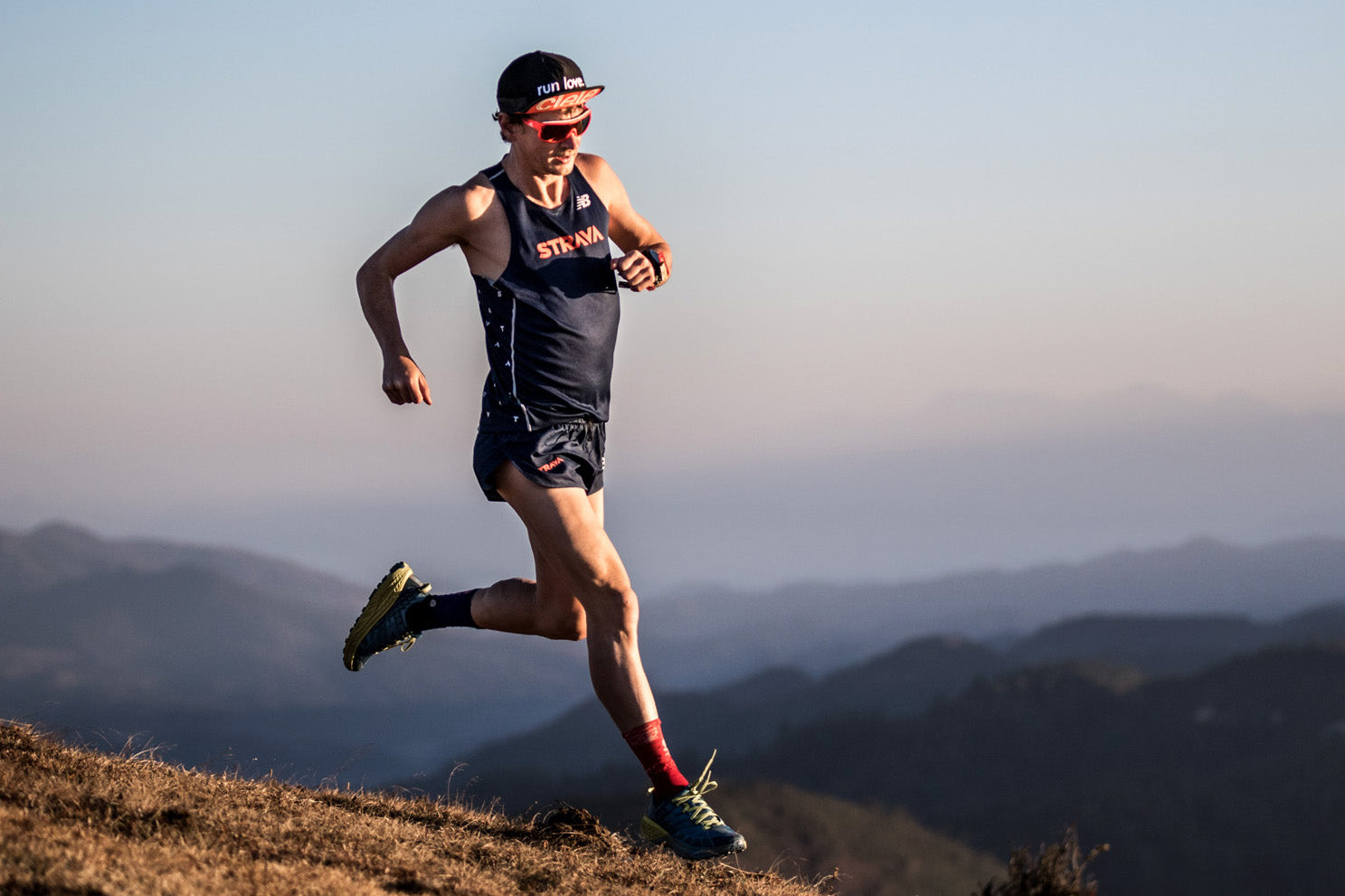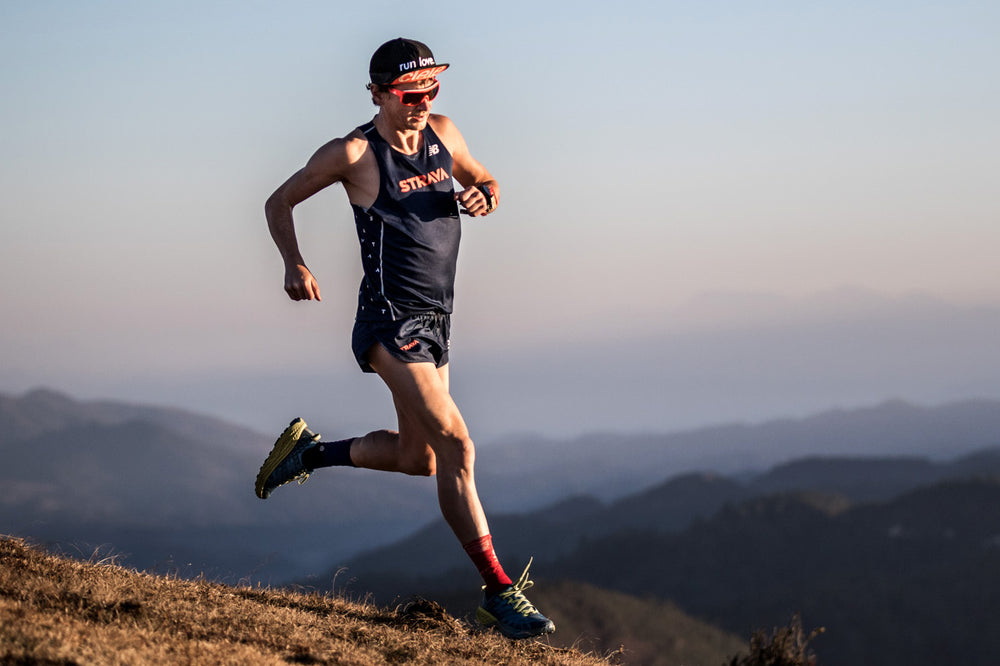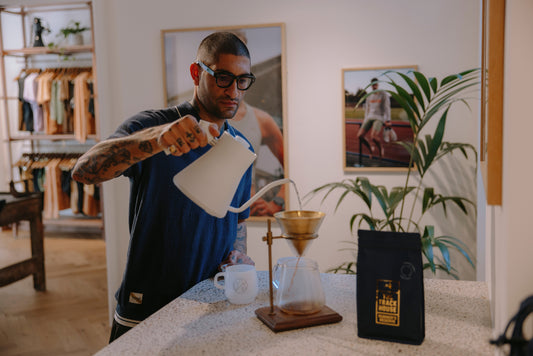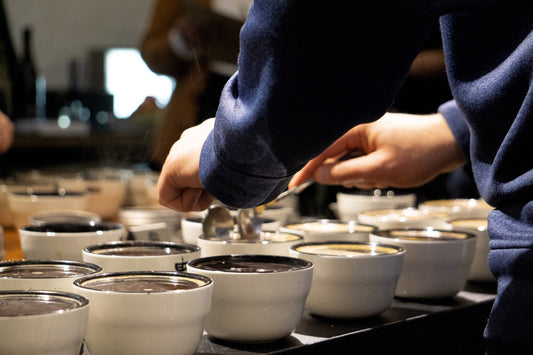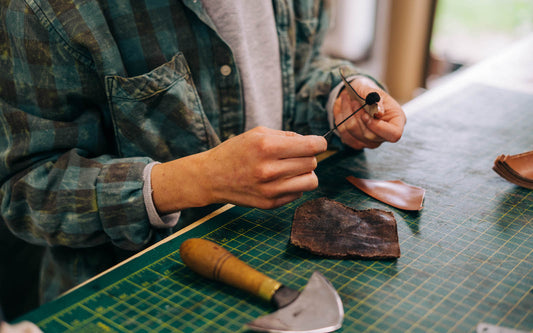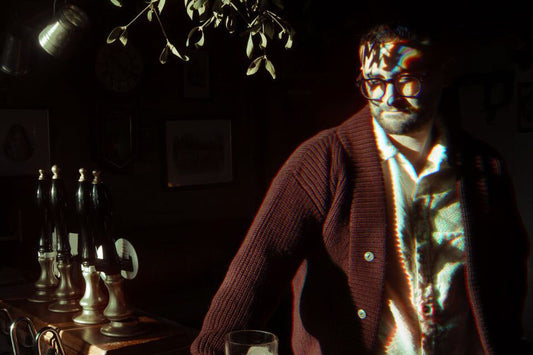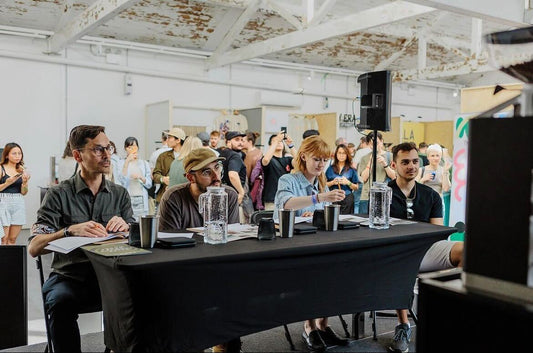
Our ‘Love Your Work’ profile series sets out to discover and showcase individuals, organisations and initiatives, all of whom share our commitment to quality.
This month, we met up with ultrarunner James Poole at our White Collar Factory Coffeebar on Old St roundabout – the same location he and his running community, Advent Running, meet at each Friday morning. Over a couple of cups of filter coffee, we discussed how James accidentally founded one of London’s largest running communities, what motivates him to run 100-mile races through some of the world’s most remote areas and why running should be a pleasure, not a punishment.
Tell us a little about yourself and your background.
I worked in asset management in the city for fifteen years and, whilst I was doing it, I was passionate about it. It was the late 1990s, there were lots of jobs and it was a good place to be. But then the financial crisis of 2008 turned the world upside down and the city became the worst place to be. Risk aversion crippled firms both in terms of investment and in terms of actually doing anything interesting.
I was living vicariously at the weekends, on the basis that I worked five days doing something I hated, and then two days doing something I loved. After a while, the imbalance between the two became clear. Even though I was earning good money, I hated the week so much that not even that mattered.
So I handed my notice in.
I had a few things going on in the running space which presented opportunities, although not necessarily financial ones, so I decided to try and make that work.
So is that when you set up your running community, Advent Running?
I had already launched Advent Running the year before. It was never meant to be a running community, it was just supposed to be twenty five days of running in December – the idea being that if you can do thirty minutes of exercise every day, in the busiest month of the year, when the days are short and the weather is miserable, then you can start to build a routine and it’ll help you carry it on into January and February.
It was only meant to be fifty or sixty friends, but then Kate Carter at The Guardian asked me to write a short piece about it, and all of a sudden the Facebook page received thousands of likes.
At the end of the twenty-five days, people were emailing me asking if we could do something in January. We ran a lot of events during December and I was still doing my day job, so it was a lot of hard work. But we decided to continue it by doing a couple of runs each week – a track run on Tuesdays, a bagel run on Thursdays [this involves starting and finishing said run at a bagel shop in Shoreditch], and some runs on the weekend.
It was all about trying to teach people that running doesn’t need to be a form of punishment. So much of the wording by big running brands are things like “smash it”, “leave it on the road” and “killing it”. The reality is that because running is physically hard on your body, most of the time you’re actually doing the opposite of that – you run fairly slowly and you pace yourself. But I guess a slogan like that wouldn’t sell many t-shirts.
I really wanted to show people that running could be so much more than an organised event with a medal and a free t-shirt. You could run for beer or run for bagels and coffee – what’s not to like?

James and the Advent Runners.
So that was a good three or four years ago. Where’s Advent Running at now?
It’s become a bit of a beast now to be honest.
We’ve got an online community of 4,500 people and I probably see around 250 of those each week at our various runs. We do runs on Tuesdays, Wednesdays, Thursdays, Fridays and Sunday and I try to lead all of them.
Everything we do is free to take part in (apart from the track night, where you have to pay for entry) and I’m a firm believer that, wherever possible, running should be free. After all, it’s such a simple sport. I could be making a lot more money by charging a monthly subscription, but I sleep better knowing that it’s free and therefore accessible and completely inclusive. It also makes life a lot easier for me because as soon as people pay for something, they have a completely different set of expectations.
Members of the Advent Running community enjoy a well-earned coffee at Workshop Coffee at the White Collar Factory after their Friday morning run.
What’s your day job now?
After leaving the city, I eventually found a role at Running Sport Heroes Group – a digital media platform. The business launched in 2014 it’s all about encouraging people to be more active. The app - Running Heroes - connects to all the major running apps and fitness trackers, and we reward people for being active. It’s like air miles for running; you earn points which you can spend on discounts and free stuff.
In terms of my interests and passions, it’s come full circle and I’m very lucky that now all my income comes from running in one form or another. It’s by no means the career financially that I had, but I’m lucky that I don’t consider a lot of what I do now as work.
Given the fact that running is such an enormous part of your life inside and out of work, has that changed your relationship with it?
That was definitely a big fear – that when running became work I’d start to hate it, but equally maybe that’s just because we have these preconceived ideas that work is meant to be something we don’t enjoy.
Like anyone, there are still parts of my job I enjoy less than others, but that’s probably mostly admin and it only takes up an hour or so of my day.
Let’s jump back slightly – why running? Was there a particular reason?
I ran as a kid and I was half good at it. When I was older I started to cycle a lot and then did some Ironman triathlons. Eventually I thought “what if I don’t do the swimming and the cycling parts?”, and fell in love with running and then ultramarathons. Another factor was living in London, where I find running is so much more efficient compared to cycling. I really enjoy running to the office – it’s quick, easy and it doesn’t matter how bad the traffic is.
People sometimes say to me “If you didn’t do the ‘run for beer’ or ‘run for pizza’, you’d be a faster runner”. They’re right, but then I’d probably be pretty miserable as well. I probably could be faster than I am, but that’s not that important to me. Having a great experience, and doing okay is much more important to me then being the fastest.
Would I have a marathon PB better than 2:44 if I lived like a monk? Probably, but then I’d be doing something in a way I didn’t enjoy or love. Our motto at Advent Running is “Fall in love with running” and you can do that in anyway you like. For some people that means beasting themselves everyday to get a better time, but that’s not for me. 
James running in the hills around Tengchong, China as he prepares for The Gaoligong by UTMB® race. Photo by David Gonthier.
You’ve since moved well beyond marathons and into the world of ultrarunning. What is it about running 100 miles or more that you find so special?
Ultrarunning has allowed me to see things on this planet that so few people will have seen, as the only way to see those things is on foot. I’ve been lucky enough to have these experiences and have met amazing groups of people through doing it, from Surrey to The Alps, Greece to China.
It really pushes me physically and mentally as well, and it makes you realise what you’re capable of. It really is just relentless forward motion – you run until you can’t run anymore, then you walk until you can’t walk anymore. Sometimes that’s not easy, but most of it’s in your head. What I love about ultrarunning is that it removes all your usual societal constraints and routine. Most days, you get up, go to work, eat, drink and sleep. When you’re running one of these long events, that all disappears. You run, you sleep when you’re tired, you eat when you’re hungry. That’s it. You just keep moving forward.
A lot of ultrarunning for me is just keeping going, and a huge part of that is mental strength and keeping your head in the game. If you’re not happy, you’ll stop. One race I did, I stopped at a petrol station at two in the morning and had a beer. It was what I needed at the time to stay happy and motivated. The loneliness of it is a strange one for me. I love running in big part because of the social aspect of it. I run to run with people and have a chat. And yet I also enjoy running these huge ultramarathons on my own. I guess in a way I’m a series of contradictions, but I’m comfortable with that.
What advice would you give to others who might be interested in dipping their toes into ultrarunning?
A hundred miles seems to be the iconic distance in ultrarunning and I honestly believe that anyone can run that distance. But, like anything in life worth having, it takes sacrifice, and the amount you’re willing to sacrifice will affect how quickly you can be ready for an ultramarathon. You could run one in a fairly short period of time if you gave up your job, your friends and your family. Or, you could take a bit longer, sacrifice a lot less, and still get to that point.
Usually, when I make a training program for someone, one of the first things I ask is “What are you going to stop doing?”, because if you think you can just add something extra into your already-busy life, that’s not going to happen.
My advice would be to have a plan and work out where you are today and where you want to be at a certain point in the future. Then, put in the work and milestones needed to get between those two points and start running right away. Frequency trumps distance every time.
Really importantly, work out what’s realistic when combined with your family and work lives – it’s all about balance. But most importantly, enjoy it. Don’t focus too much on the end goal. If you go out and enjoy every training run, or almost every run, then it becomes more about the process, and not the result. On race day, a myriad of things could happen that are out of your control. But, if you’ve enjoyed the process, it will matter less if something does go wrong.

James tackles a steep section of the course during The Gaoligong by UTMB® race in Tengchong, China. Photo by David Gonthier.
What do you think about whilst running?
Everything and nothing to be honest.
I like to think I have a million good ideas when I’m out running, but I’ve yet to come up with a way of actually recording them and then I’ve forgotten them by the end of the run! I find running can be very therapeutic – a bit like sleeping on something. Otherwise, I might think about ideas for work, or ideas for Advent Running.
This differs for races when I’m more likely to be thinking about the route and the next checkpoint. I’ll often break a long race down into more manageable chunks and reward myself for reaching a certain point – “when I get to the next aid station I’m going to have a sausage roll”, for example, or, close to the end of a race, “I can’t wait for a cold beer.”
We know you often take coffee with you on these runs. Why is that?
The main reason? Life’s too short for shit coffee. But also, there’s something about the process of making a cup of coffee that I love. The way that changing the grind or the brew method can really affect the taste of a particular coffee is fascinating. I ran around Ibiza over Easter and took a bag of Workshop Coffee and a V60 with me. I took a mini-stove and would stop at the side of the trail to make coffee. When you wake up in a tent in the middle of nowhere, you know you’re going to start the day on the right foot if you can brew a proper cup of coffee.
And where did your love of coffee come from?
Before running, I did mountain bike racing, then cycling, then triathlon. I’m a bit of gear geek, I love cycling culture and that’s where my love of coffee came from. I’m a real supporter of the ‘do one thing well’ philosophy and of spending more money on less things. I can’t stand ‘stuff’, so I only buy things I really want and need. I bought a Rocket espresso machine (the perks of a city salary) and became really fascinated by the process of making good coffee. It was half science, half art, and that really appealed to my geekiness.

James limbering up ahead of the Ultra Gobi race - a 400km non-stop, self-navigation ultramarathon held in the Gobi desert on the edge of the Tibetan Plateau. This photo & the first by James Carnegie.
Have you ever fallen out of love with running?
This year I’ve committed to more business stuff and done less running and, to be honest, I’ve lost my mojo a little bit, rather than fallen out of love. Whereas last year I would never have found an excuse not to run, this year I’ve definitely felt a bit more “I can’t be bothered”. No real reason. It just happens. I find these things ebb and flow and, again, it’s about balance. You can’t do everything, and something has to give.
Where’s the best place you’ve ever run?
I’ve run in too many places to say which is the best, but a run I did in Sri Lanka a few years back really stands out. It was just an evening run, not a race, through these amazing tea plantations in the mountains and I went through all of these villages in amongst the plantations and people were continually coming out to cheer me on. It made me grin for hours.
The 100-mile race I did in China in March of this year has to be up there, too. It was in a place called Tengchong on the border with Myanmar on the old Silk Road. There’s obviously still a lot of poverty in China, but the growing middle class is really interesting – there will be more middle class people in China by the mid-2020s than the population of Europe. Running didn’t exist there five years ago, so to see something so new was fascinating. There’s no running history in China – no Roger Bannister, no Steve Jones – it’s ground zero, and that also means there’s no preconceptions as to what running should or shouldn’t be, no belief that running is a punishment.

James at the end of the 400km Ultra Gobi race. Photo by Lloyd Belcher.
What’s next for you?
I've just got back from my second trip to China this year - a 409km race in the Gobi Desert - and I'm deep in the planning mode for 2019. Running has provided me with many opportunities to see far flung places and experience amazing things, so I'm keen to share this with others. I've been organising trips to the Alps with Advent Running for the last three or four years and I plan to build on that next year with some new destinations and different challenges. And of course, in just a few weeks time, it's a return to where it all began, Advent Running and this year's challenge. I haven't quite got all the details nailed down yet, but it promises to be bigger and better than ever.
James and the Advent Running community run from Workshop Coffee at White Collar Factory every Friday morning. Convening at 7:00 a.m. and departing at 7:10 a.m., they return from their session at 8:00 a.m. for a well-earned coffee. All are welcome and you can find out more here.
Share:

